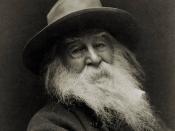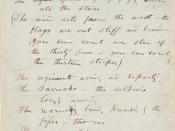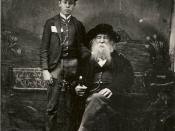Leaves of Grass by Walt Whitman
By ghadatu | Studymode.com
Leaves of Grass by Walt Whitman In the twentieth century, the name Walt Whitman has been synonymous with poetry. Whitman's most celebrated work, Leaves of Grass, was the only book he ever wrote, and he took a lifetime to write it. A large assortment of poems, it is one of the most widely criticized works in literature, and one of the most loved works as well. Whitman was unmarried and childless, and it has been noted that Leaves of Grass consumed him greatly; James E. Miller Jr. writes: "â¦he guided his poetic offspring through an uncertain, hesitant childhood, a lusty young manhood, and a serene old ageâ¦it is difficult to write the life of Whitman without writing instead of the life and times of his bookâ¦Whitman was the kind of parent who lives his life through his child." (Miller 15) The "poetic offspring" that Miller writes of is of course Leaves of Grass. Whitman poured his soul into the work, as he questioned himself and observed his demeanor through his writing. He "fathered" the tome, as after its initial publishing Whitman went on to release revision after revision as time progressed. Miller goes on to reflect on Whitman's methods, as he tells the reader of Whitman's curiosity towards life, particularly curious about his own meaning in the world in which he lived. "Like any individual of depth and complexity, Whitman was continuously curious about who he wasâ¦(he had) a lusty enthusiasm, a hearty relish for life lived at all times to its fullest intensity." (Miller 17) The life Whitman lived "to its fullest intensity" started in West Hills, Long Island, May 31, 1819. He was one of nine children to Walter and Louisa Whitman, his father a farmer...


